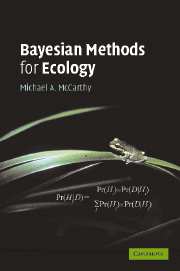1 - Introduction
Published online by Cambridge University Press: 05 June 2012
Summary
There is a revolution brewing in ecology. Granted, it is a gentle and slow revolution, but there is growing dissatisfaction with the statistical methods that have been most commonly taught and used in ecology (Hilborn and Mangel, 1997; Wade, 2000; Clark, 2005). One aspect of this revolution is the increasing interest in Bayesian statistics (Fig. 1.1). This book aims to foster the revolution by making Bayesian statistics more accessible to every ecologist.
Ecology is the scientific study of the distribution and abundance of biological organisms, and how their interactions with each other and the environment influence their distribution and abundance (Begon et al., 2005). The discipline depends on the measurement of variables and analysis of relationships between them. Because of the size and complexity of ecological systems, ecological data are almost invariably subject to error. Ecologists use statistical methods to distinguish true responses from error. Statistical methods make the interpretation of data transparent and repeatable, so they play an extremely important role in ecology.
The Bayesian approach is one of a number of ways in which ecologists use data to make inferences about nature. The different approaches are underpinned by fundamentally different philosophies and logic. The appropriateness of different statistical approaches has been fiercely debated in numerous disciplines but ecologists are only now becoming aware of this controversy.
- Type
- Chapter
- Information
- Bayesian Methods for Ecology , pp. 1 - 29Publisher: Cambridge University PressPrint publication year: 2007



